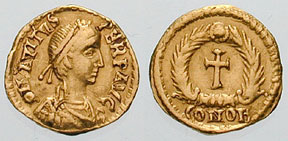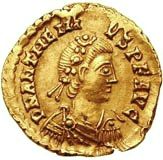|
Ecdicius
Ecdicius Avitus ( – after 475) was an Arverni aristocrat, senator, and ''magister militum praesentalis'' from 474 until 475. As a son of the Emperor Avitus, Ecdicius was educated at ''Arvernis'' (modern Clermont-Ferrand), where he lived and owned some land. In the 460s he was one of the richest and most important persons in the western Empire and he was present at the court of Anthemius until 469. Ecdicius and his brother-in-law Sidonius Apollinaris, the Bishop of Clermont, took charge of the defence of the Auvergne against the Visigoths from 471 to 475. The Visigothic king Euric besieged many cities, but Ecdicius, with a private army of horsemen paid for out of his own wealth, brought provisions to those cities, lifted their sieges, and fed a multitude of poor.Sidonius Apollinaris, ''Epistulae'' III.3; translated by W.B. Anderson, ''Sidonius: Poems and Letters'' (Harvard: Loeb Classical Library, 1965), vol. 2 pp. 13ff The size of his warband seems to have been quite small --- ... [...More Info...] [...Related Items...] OR: [Wikipedia] [Google] [Baidu] |
Julius Nepos
Julius Nepos (died 9 May 480), or simply Nepos, ruled as Roman emperor of the West from 24 June 474 to 28 August 475. After losing power in Italy, Nepos retreated to his home province of Dalmatia, from which he continued to claim the western imperial title, with recognition from the Eastern Roman Empire, until he was murdered in 480. Though Nepos' successor in Italy, Romulus Augustulus (), is traditionally deemed the last western Roman emperor, Nepos is regarded by some historians as the true last emperor of the west, being the last widely recognised holder of the position. A native of Dalmatia, Nepos began his career as the semi-autonomous governor of the province, succeeding his uncle Marcellinus, a prominent general, as ('master of troops') of Dalmatia. After the death of the western emperor Anthemius (), who had been appointed by the eastern emperor Leo I (), as well as Anthemius' successor Olybrius (472), Leo sought to assert his authority in the west, granting Nepos ... [...More Info...] [...Related Items...] OR: [Wikipedia] [Google] [Baidu] |
Avitus
Eparchius Avitus (died 456/7) was Roman emperor of the Western Roman Empire, Western Empire from July 455 to October 456. He was a Roman Senate, senator of Roman Gaul, Gallic extraction and a high-ranking officer both in the civil and military administration, as well as Roman Catholic Diocese of Piacenza-Bobbio, Bishop of Piacenza. He opposed the reduction of the Western Roman Empire to Roman Italy, Italy alone, both politically and from an administrative point of view. For this reason, as Emperor he introduced several Gallic senators in the Imperial administration; this policy, however, was opposed by the senatorial aristocracy and by the people of Rome, who had suffered from the sack of Rome (455), sack of the city by the Vandals in 455. Avitus had a good relationship with the Visigoths, in particular with their king Theodoric II, who was a friend of his and who acclaimed Avitus Emperor. The possibility of a strong and useful alliance between the Visigoths and Romans faded, h ... [...More Info...] [...Related Items...] OR: [Wikipedia] [Google] [Baidu] |
Sidonius Apollinaris
Gaius Sollius Modestus Apollinaris Sidonius, better known as Sidonius Apollinaris (5 November, 430 – 481/490 AD), was a poet, diplomat, and bishop. Born into the Gallo-Roman aristocracy, he was son-in-law to Emperor Avitus and was appointed Urban prefect of Rome by Emperor Anthemius in 468. In 469 he was appointed Bishop of Clermont and he led the defence of the city from Euric, King of the Visigoths, from 473 to 475. He retained his position as bishop after the city's conquest, until his death in the 480s. He is venerated as a saint in the Catholic church, the Orthodox Church, and the True Orthodox Church, with his feast day on 21 August. Sidonius is "the single most important surviving author from 5th-century Gaul" according to Eric Goldberg. He is one of four Gallo-Roman aristocrats of the 5th- to 6th-century whose letters survive in quantity; the others are Ruricius, bishop of Limoges (died 507), Alcimus Ecdicius Avitus, bishop of Vienne (died 518) and Magnus Felix En ... [...More Info...] [...Related Items...] OR: [Wikipedia] [Google] [Baidu] |
Anthemius
Procopius Anthemius (; died 11 July 472) was the Western Roman Empire, Western Roman emperor from 467 to 472. Born in the Byzantine Empire, Eastern Roman Empire, Anthemius quickly worked his way up the ranks. He married into the Theodosian dynasty through Marcia Euphemia, daughter of Eastern emperor Marcian. He soon received a significant number of promotions to various posts, and was presumed to be Marcian's planned successor. However, Marcian's sudden death in 457, together with that of Western emperor Avitus, left the imperial succession in the hands of Aspar. He instead appointed Leo I (emperor), Leo, a low-ranking officer, to the Eastern throne, probably out of fear that Anthemius would be too independent. Eventually, this same Leo designated Anthemius as Western emperor in 467, following a two-year interregnum that started in November 465. Anthemius attempted to solve the two primary military challenges facing the remains of the Western Roman Empire: the resurgent Visigoth ... [...More Info...] [...Related Items...] OR: [Wikipedia] [Google] [Baidu] |
Papianilla (wife Of Sidonius Apollinaris)
Papianilla (''floruit'' 455 CE) was an aristocrat of Roman Gaul. She was the daughter of future Western Roman Emperor Eparchius Avitus, and wife of bishop, author, and letter-writer Sidonius Apollinaris. Her father, Eparchius Avitus, rose from the Gallo-Roman senatorial aristocracy to become Western Roman Emperor from 455 CE to 456 CE. Papianilla had two brothers, Agricola and Ecdicius, and possibly some sisters; she was related to another Papianilla (wife of the prefect Tonantius Ferreolus). The family lived in the Auvergne region. Before her father's rise to the throne (455), she married Sidonius Apollinaris, another aristocrat, who may have been a distant maternal relative. The marriage was highly advantageous for Sidonius, making him part of the most powerful family in the region. They had three or four children: Apollinaris, Severiana, Roscia and Alcima (the latter, mentioned only in Gregory of Tours and not in Sidonius' letters, being possibly another name for Severi ... [...More Info...] [...Related Items...] OR: [Wikipedia] [Google] [Baidu] |
Flavius Orestes
OrestesJ.R. Martindale ''The Prosopography of the Later Roman Empire'' vol. II pp. 811–812. Cambridge University Press, 1980 (died 28 August 476) was a Roman general and politician of Pannonian ancestry. He joined the court of Attila the Hun in his native Pannonia, in which he reached a high position, becoming one of Attila's most trusted men. Orestes also held considerable influence in the late Western Roman Empire. His son Romulus Augustulus became Roman Emperor of the West. Biography Born to a Roman aristocratic family from Pannonia Savia, Orestes was son of Tatulus, a pagan, and son-in-law to Romulus, who served as ''comes'' in the Western Roman Empire. After Pannonia was ceded to Attila the Hun, Orestes joined Attila's court, becoming one of Attila's intimate advisors and most trusted lieutenants, and reaching high position as a secretary (''notarius'') in 449 and 452. In 449 Attila sent him twice to Constantinople with ambassador Eslas.Priscus, ''History'', fragment ... [...More Info...] [...Related Items...] OR: [Wikipedia] [Google] [Baidu] |
Gundobad
Gundobad (; ; 452 – 516) was King of the Burgundians (473–516), succeeding his father Gundioc of Burgundy. Previous to this, he had been a patrician of the moribund Western Roman Empire in 472–473, three years before its collapse, succeeding his uncle Ricimer. He is perhaps best known today as the probable issuer of the '' Lex Burgundionum'' legal codes, which synthesized Roman law with ancient Germanic customs. He was the husband of Caretene. Early life Gundobad seized the title of Patrician when his uncle Ricimer, who had been the power behind the throne for the Western Empire, died on 18 August 472. According to John of Antioch, Gundobad had previously executed the deposed emperor Anthemius on his uncle's orders. Once in power, Gundobad elevated the current , Glycerius, to the position of Roman emperor in the West. However, not long after this, Gundobad left for Burgundy where his father, Gundioc, had died; the exact date is unclear, with authorities stat ... [...More Info...] [...Related Items...] OR: [Wikipedia] [Google] [Baidu] |
Clermont-Ferrand
Clermont-Ferrand (, , ; or simply ; ) is a city and Communes of France, commune of France, in the Auvergne-Rhône-Alpes regions of France, region, with a population of 147,284 (2020). Its metropolitan area () had 504,157 inhabitants at the 2018 census.Comparateur de territoire: Aire d'attraction des villes 2020 de Clermont-Ferrand (022), Unité urbaine 2020 de Clermont-Ferrand (63701), Commune de Clermont-Ferrand (63113) INSEE It is the Prefectures in France, prefecture (capital) of the Puy-de-Dôme departments of France, département. Olivier Bianchi is its current List of mayors of Clermont-Ferrand, mayor. Clermont-Ferrand sits on the plai ... [...More Info...] [...Related Items...] OR: [Wikipedia] [Google] [Baidu] |
Magister Militum
(Latin for "master of soldiers"; : ) was a top-level military command used in the late Roman Empire, dating from the reign of Constantine the Great. The term referred to the senior military officer (equivalent to a war theatre commander, the emperor remaining the supreme commander) of the empire. The office continued to exist end evolve during the early Byzantine Empire. In Greek language, Greek sources, the term is translated either as ''strategos#Byzantine use, strategos'' or as ''stratelates'' (although these terms were also used non-technically to refer to commanders of different ranks). Establishment and development of the command The office of ''magister militum'' was created in the early 4th century, most likely when the Western Roman emperor Constantine the Great defeated all other contemporary Roman emperors, which gave him control over their respective armies. Because the Praetorian Guards and their leaders, the praetorian prefect, Praetorian Prefects, had suppor ... [...More Info...] [...Related Items...] OR: [Wikipedia] [Google] [Baidu] |
Patrician (post-Roman Europe)
Patricianship, the quality of belonging to a patriciate, began in the ancient world, where cities such as Ancient Rome had a social class of Patrician (ancient Rome), patrician families, whose members were initially the only people allowed to exercise many political functions. In the rise of European towns in the 12th and 13th centuries, the patriciate, a limited group of families with a special constitutional position, in Henri Pirenne's view, was the motive force. In 19th century Central Europe, the term had become synonymous with the upper Bourgeoisie and cannot be interchanged with the Middle Ages, medieval patriciate in Central Europe. In the maritime republics of the Italian Peninsula as well as in Geographical distribution of German speakers#Europe, German-speaking parts of Europe, the patricians were as a matter of fact the ruling body of the medieval town. Particularly in Italy, they were part of the nobility. With the establishment of the medieval towns, Italian city-s ... [...More Info...] [...Related Items...] OR: [Wikipedia] [Google] [Baidu] |




